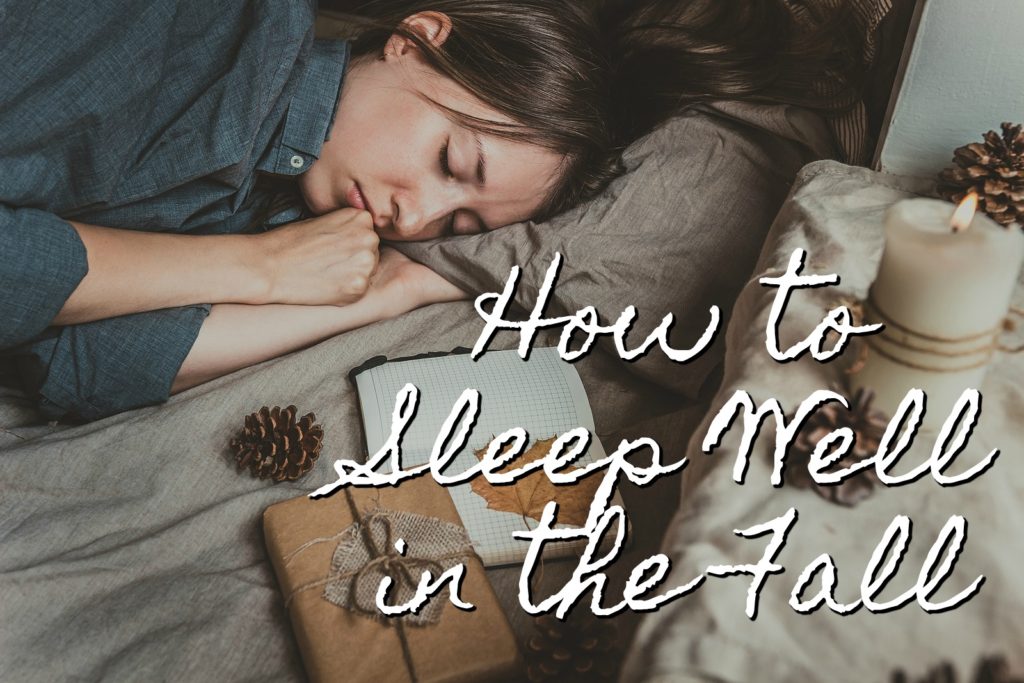Fall, the season of pumpkin flavored everything and temperatures dropping. For some people, the change from summer to fall can result in a loss of sleep or poor sleep quality.

While the cool nights of fall can be a great reprieve from the hot evenings of summer, other sleep concerns can pop up this time of year that disrupt your sleep quality. However, if you follow the advice given below, you may find yourself sleeping soundly once again.
Four Tips to Sleep Well in the Fall
Seek the Light
In the fall, the days are shorter so you are not subjected to as much sunlight. Less sun exposure can cause the amount of vitamin D in your system to drop. Not only does this make you feel fatigued, but it also throws off your circadian rhythm. Your circadian rhythm is a sort of internal clock that regulates feelings of sleepiness and wakefulness. You can’t make the days longer, but you can expose yourself to as much sun as possible to help counteract this negative effect. In the morning, expose yourself to the sun at your earliest convenience. If possible, go for a morning walk. In the evenings, to help signal to your brain that it is time to wind down, lower the indoor lights and avoid screen time within one to two hours of bedtime.
Embrace the Cool
In the fall, it is tempting to light a fire or crank up the heat in the house and snuggle under thick blankets, but for quality sleep keeping things cool is better. You should, at least, be keeping your bedroom no warmer than 75 degrees. The National Sleep Foundation (NSF) states that the ideal temperature for sleep is between 60 and 67 degrees. When you sleep, your internal temperature drops slightly. If you become exceedingly warm, your body will find it difficult to drop its temperature back down, which will cause you to wake. However, you don’t want to let it get too cold When the temperature drops below 54 degrees it can also negatively impact sleep.
Routine is Good
There are two “routines” to maintain in the fall to help you achieve your best rest. One is to maintain a regular sleep and wake schedule, even on the weekends. Waking up and going to bed at the same time will help program your internal clock or circadian rhythm. When your circadian rhythm remains intact it will signal to your body that it is time to sleep or time to be awake at the appropriate times, helping you to sleep better and feel more rested during the day. The second is to have a bedtime routine. Each night when you are getting ready to wind down for bed, try and perform the same activities in the same order. This habit will send a signal to your brain that it’s time to settle down for the evening, allowing you to fall asleep more easily.
Pay Attention to Your Mood
When the daylight hours are fewer in the fall and winter, a type of depression known as Seasonal Affective Disorder (SAD) will affect around half a million people. The exact cause of SAD is still unknown, but it is known that it can alter a person’s melatonin levels. Melatonin plays an important role in your sleep cycle. To stay on a normal schedule, you need to exercise regularly, maintain a positive sleep environment, and as suggested above, stick to your routines- even on the weekend.
Sleep is essential to a healthy, productive life. It has been proven that sufficient, quality sleep has a positive impact on mental, physical and emotional well-being. If you are struggling to get the rest you need, you may benefit from a sleep consultation with Valley Sleep Center. Call 480.830.3900 to schedule an appointment at one of our five convenient Valley locations today.

